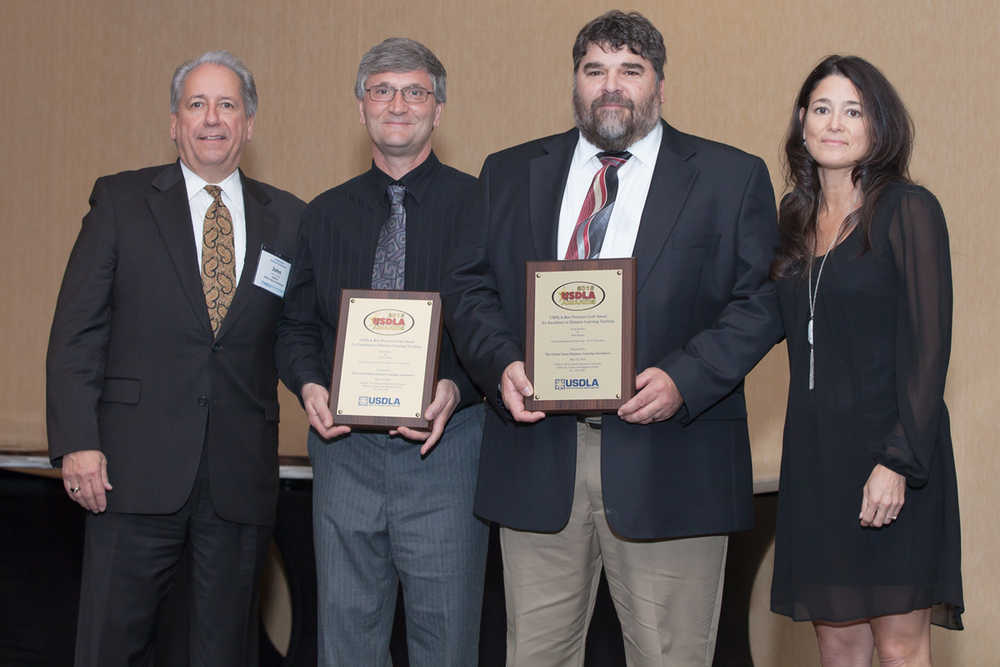This spring, Kenai Central High School World History teacher Greg Zorbas and Soldotna Prep Alaska Studies teacher Rob Sparks were recognized for the impact their expertise has had on their students and the international videoconferencing industry.
The two educators received the United States Distance Learning Associations Gold award in the category of Best Practices Awards for Excellence in Distance Learning Teaching for videoconferencing technology in K-12 education.
“It says some people are recognizing that we are putting in a lot of work,” Zorbas said. “It hasn’t been easy, believe me. For me it is just rewarding in the sense that other people have recognized the amount of work and amount of effort we have been putting in.”
Sparks added “any time you get recognition, that is confirmation or affirmation that what you are doing is good.”
Since they first introduced the primarily collaborative videoconferencing technology in 2006, the walls of their classrooms have continuously grown to include students from all around the world.
It was a platform many rural schools had been using around the state for years, but took off in the hands of the two educators.
Sparks said at first he wasn’t entirely on board. Zorbas had to keep suggesting new interfaces to work with, and push him out of his comfort zone.
For years now, Sparks and Zorbas’s students have met to learn with and from international peers via videoconferencing technology, in the Classroom Without Walls program, which focuses on collaboration instead of remembering materials and regurgitating information, Sparks said.
“We’ve really never ever given tests, because that’s not what education is about — not the standards and high stakes testing that is so backwards thinking and so bad for education,” Sparks said. “We have just basically ignored it … we are not crazy, we are not just trying to buck the system — it’s really valid thing that we don’t give tests. I’ve never believed in that. Education is so much more than through measurable tests.”
The two teachers have always been “group oriented,” Sparks said, and the benefits of cooperating through the ever-evolving platforms of modern technology are numerous.
Students are often more inclined to bring their best if they are working with a group they aren’t normally accustomed to, Sparks said.
The same goes for the teachers.
“When more people are watching what you are doing you will try to do a better job,” Sparks said.
Further, the educators believe they are meeting their students halfway, by introducing into classrooms the same ways kids are choosing to communicate outside their schools.
Very few express dislike for the highly collaborative process.
Zorbas said he and Sparks require their students to “be together” every single day of the course, be it through any video platform including Polycom, Skype, Microsoft lync, or Facetime.
Last year he and his students worked with Kendra Remson, a former student of his turned Homer High School teacher, and her class each day to jointly deliver their World History curriculum.
“They still have to develop those skills of reading body languages and tone and learning to get along with each other and all of those things come along with the ability to see each other,” Zorbas said.
The strategy has been so effective, the teachers have designed an entire series of courses dedicated to instruction through videoconferencing, while students receive social studies or practical arts credits.
Two of his students, who originally wanted to become nurses, have evolved their professional goals to incorporate the field of telemedicine after taking these courses, Zorbas said.
It has become a career pathway, Sparks said.
Through the classes students will gain certifications, become instructors themselves, and will train other classes in how to use the technology, he said.
Kenai Peninsula Borough School District administrators have always been supportive of the continuous adaptations Zorbas and Sparks have made in their curriculum.
Information Services Programmer Casey Olson won the Alaska Society for Technology in Education 2016 Technology Support of the Year award for his constant work to help develop the different platforms the two teachers find to bring into the mix.
The school district has become an international presence as leaders in videoconferencing instruction, Zorbas said.
“The overwhelming, overwhelming consensus from the feed feedback we get is that our students are light-years ahead of most,” he said. “They can’t believe our kids are doing this. They are so well spoken and so adept at communicating with adults at an adult level.”
Reach Kelly Sullivan at kelly.sullivan@peninsulaclarion.com.

